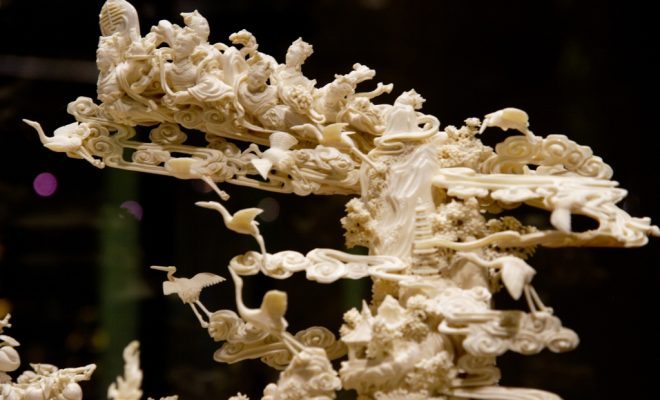 "Ivory" courtesy of [Matthias Rosenkranz via Flickr]
"Ivory" courtesy of [Matthias Rosenkranz via Flickr]
News
U.S. Imposes New Rules on Ivory Trade
In President Barack Obama’s 2013 Executive Order “Combating Wildlife Trafficking,” he called on the United States government and international partners to enact legislation to counter the “international crisis” of trading the “derivative parts and products” of endangered animals. The U.S. Fish and Wildlife Service (USFWS) took aggressive steps to address that directive on Thursday, issuing stricter regulations on imports, exports, and interstate movements of elephant ivory. The new rules, which were first proposed in 2015, received overwhelming support during a public comment period.
Under the tighter rules, interstate ivory sales are restricted to antiques (must be 100 years or older, among other standards) and items with no more than 200 grams of ivory worked into them. Sport-hunted trophies cannot be moved across state lines (though two per year are allowed to be imported, whereas before there was no limit), and neither can ivory that is part of a family inheritance.
Imports and exports of ivory that has been carved or worked into musical instruments, figurines or other items are more tightly controlled. Raw ivory–whether imported or exported–remains prohibited.
A majority of African elephants roam the grassy savannas of southern Africa, in Botswana, Zimbabwe, Namibia and other areas near the Zambezi River. Estimates put elephant deaths at 96 each day, the equivalent of eight percent of the entire population each year. If that rate continues, the species could be wiped out in 10 years. Elephants are targeted by poachers for their milky white tusks, which are often exported raw and then processed into a variety of forms: intricate artwork, piano keys, and jewelry. China is the world’s largest ivory consumer, followed by the U.S. Japan, Vietnam and Thailand are also large ivory markets.
“These new regulations are designed to, first of all, close down and stop loopholes, make them water tight, and to provide motivation and an example to other countries,” said Patrick Bergin, CEO of the African Wildlife Foundation, in an interview with Law Street. “It’s about more than the message.”
Bergin was one of eight experts on a council that advised the USFWS in shaping the new rules. He said the update will help clarify ambiguous language. Previously, ivory antiques were difficult to identify and police, and the line between illegal and legal sales were easily blurred. These new regulations, Bergin said, are meant to bolster the ability to enforce illicit ivory trade while allowing not harmful items that have little or no impact on elephant deaths to continue to be bought and sold.
There have been conflicts with musicians whose instruments contain traces of ivory. Some violin bows, for example, contain the substance. A past decree by the USFWS required permits for musicians with instruments containing ivory to travel internationally for performances. Those permits were difficult to procure, and the new rules confirm that such instruments have little effect on elephant poaching.
“The goal here really is to shut down the trade in ivory and the possession of ivory without causing any undo nuisance to people,” Bergin said.
In a statement, USFWS Director Dan Ashe said: “Our actions close a major avenue to wildlife traffickers by removing the cover that legal ivory trade provides to the illegal trade. We still have much to do to save this species, but today is a good day for the African elephant.”








Comments